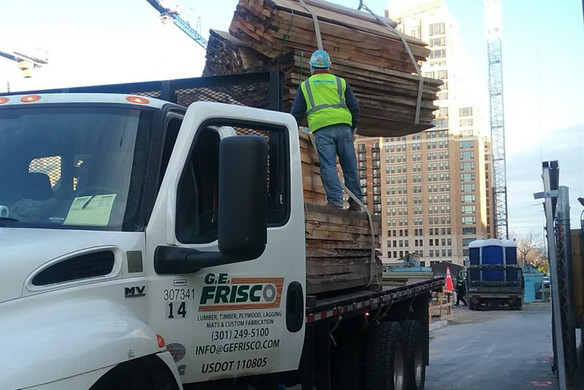Table of contents
G.E. Frisco is one of the largest lumber suppliers in the Mid-Atlantic region, supplying building materials to projects ranging from the FedEx Field in Maryland to the Walter E. Washington Convention Center in Washington, D.C. The construction materials supplier has been family-owned since 1985. “Since day one we’ve been a lumber supplier to commercial contractors. We operate primarily in the D.C., Baltimore, and Philadelphia areas to supply any subcontractor on a commercial job within our market,” said G.E. Frisco CEO Neil Agrawal. “We can stock and source any type of wood that’s used in the construction process and over the years we’ve expanded our product offerings.”
The company offers a large range of products and services to an equally large range of customers. While the majority of their customers are in commercial construction or are contractors, Agrawal says, they sell to customers walking into their shop looking for a single 2×4 as well.
Balancing in-person and remote payments
“Most of what we do today is still done on credit, so that means that our customers have established credit accounts with us and when we sell to them we’re selling to them on credit,” said Agrawal. “The majority of our customers send us checks, and the terms are anywhere from 30, 60, or 90 days. Our average AR (accounts receivables) is about 45 days, so that’s a typical customer.”

While many of G.E. Frisco’s customers are working on large-scale projects, even those with smaller orders pay remotely. Agrawal says that while the business continues to accept corporate checks for customers with credit accounts, they’ve stopped accepting personal checks after numerous incidents of receiving fraudulent checks or checks that bounced. This shift in policy has supported the growth of many of their B2B customers paying with credit cards.
“Around 10–15% of our total billing gets processed on credit cards. That comes from two sources — one side of it is where we have the walk-in-the-door, non-credit customers that come in,” said Agrawal. “Those customers opt to pay with credit cards. A lot of what we do is actually card-not-present transactions where we’re taking credit card information either over the phone or the customer’s giving us that information, especially in the commercial world where I might place an order on behalf of ABC Construction but someone totally different will go to pick up that order, and that person will most likely not actually have that credit card on hand.”
Growing an established business
“If you could give me the crystal ball and say ‘Oh yeah, Neil, in five years this company is largely doing the same thing but bigger or with more employees, maybe more profitable,’ I wouldn’t consider that a success. I’m constantly evaluating what our growth opportunities are. Me, personally, I’m out and about trying to understand what’s the new greatest thing going on in our industry,” said Agrawal.
Agrawal has already noticed significant growth in trim and molding, especially in multi-family buildings, by looking at G.E. Frisco’s historical sales data. He is keeping this in mind as they plan for investments in new equipment. An in-house strategic squad — made up of himself, senior management, and the executive team — meets regularly to plan ahead for the business.

He says the lumber industry has lots of room to grow and has been slow to adopt new technology. His business’s adoption of different technologies has made commerce frictionless and secure as well as giving him real-time insights into parts of the business that need active management, like inventory.
“Our industry, it is very slow to adopt innovation, a lot of our productivity hasn’t grown like other industries, but I think some of that will change out of necessity, out of investment, out of the desire to innovate out of a generational shift … and that’s something I’m really looking forward to,” said Agrawal. “I believe that there will be a lot of positive change coming about. More scalability, a lot more cost reduction, hopefully increased profitability. Historically, construction is a very low-profit industry on a margin basis, so I do believe that some of that will change a bit.”
Despite anticipating challenges ahead with rising interest rates and inflation, Agrawal says he’s cautiously optimistic and excited by what the company can do moving forward.
![]()











